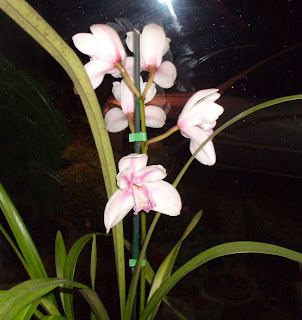
from w.Sunday afternoon I attended an author talk at Geelong library by a well-known Australian writer, Garry Disher. I first came across him when he marked my assignments in my first year at Deakin Uni, and fortunately his encouragement then kept me on track. I've written rough notes on his talk in case budding writers are reading this blog.
Garry Disher Author talk in Geelong, May 2010Collete said something about writing about the things you know or like, but even look harder at the things that cause you pain. About a theme - you don’t know till the end of the book. Don’t’ wait for inspiration. Communicating yes. Communicate an emotion. Fiction is fact distorted into truth. Ask yourself, are you writing honestly.
Make em large, make em cry, make em wait is a well-known quote. Delay gratification, partial outcome, so pacing is important.
Garry Disher told about his early years when home was a farm in South Australia, with books in the house, dreaming, making up stories in his head. (A writer needs to be a reader. Many do not read.). From an early age wanted to be a writer. He moved to Melbourne and did a History Masters which was good for knowing background to stories set in the past. His first story was published in Overland. He went to Standford in California on a scholarship which was excellent, mainly workshopping stories. His first book was published by Neptune Press in Geelong (no longer exists). He worked in adult education then Homesglen , teaching. In 1987 he became a fulltime writer but as we all know, income fluctuates - only 10% of a book in royalties.
Some tips about writing.
Short stories don’t have to move much. Some pieces of writing are sensory deprived. We must make pictures in the head. Need senses of smell, taste, etc.
Main categories he has written in are
I. Crime, 2 Children, 3. Literary /general, 4. Non-fiction such as a how to write book.
The Bamboo Flute is for adults inspired by his father who played the flute by ear.
When he creates a character he is not always finished with a character at the end of a story.
Children’s writing. The world of children is warm and welcoming.
General and literary fiction. Although he mostly writes with a linear plot, sometimes he does it differently e.g.
The Sunken Road was not chronological but told through themes. It’s about his mother. He likes Alice Munro’s stories.
Crime fiction, is driven by a question of what next. Wyatt novels – will he get away with it. Ideas come from newspapers. He had two author tours to Germany where they are popular, very different from German crime novels. The Inspector Challice novels are regional and set in the Mornington Peninsular. There is both public and private life of the police. He is interested in place, seasons, sociological situations, change, the estates, no transport, welfare in this place.
Theme is not first known as you are writing a story, it may be loss of innocence, getting of wisdom, where is home, searching.
Quiller stories were set in the war years, photo reconnaissance pilot who is never rooted anywhere, one idea is to look at the betrayal of an army mate.
Don’t throw anything away, leave a story a week, wait. There is no such thing as writer’s block, just keep writing every day until you know more.
Finding a voice for a book, what point of view, tone,
In The Divine Wind he took two weeks to write the opening paragraph.
Ideas come from newspapers for the core of the story, What if - Incidents around me, overhearing women talking about a killer. Letterbox story, who did it - Road rage, and what if - Leaflet about aerial photography everything went wrong with grandma came, what if.
Why crime fiction – there is a narrative drive, and this kind of book is reassuring because real life is full of mistakes, there is injustice, the appeal of the hero. Sara Parensky introduced detectives that have family, messy lives. We need to tell about the world we live in, the social tensions of our time, and appeal to our darker side of ourselves.
We need to withhold details because it’s a mistake to start too soon with the outcomes.
Be yourself and use your own concerns.
Plan the direction of the plot but you can change it later. Most writers start with autobiographical stuff and there is too much emphasis describing feelings, no action/ You might need to change the point of view, change outcome, add other characters. Don’t put everything in and make it historical and perhaps boring. Not too many flashbacks. Not too many characters. Change direction, turning points, reduce characters such as from seven to three.
He writes in longhand all without editing, then on a computer with four or five edits. Has a three hour face to face talk with editor before the final edit.
Numerous questions followed from the audience then Garry Disher signed books from the nearby book stall. For more information about the author go to
his website.

Labels: Garry Disher talk

 from w
from w




















































